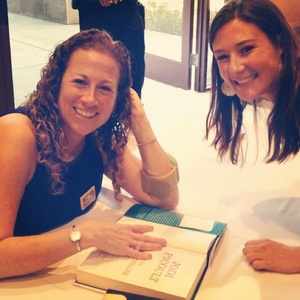
Ask any author who their role models are and I guarantee they can rattle off a lengthy list of writers who have influenced them from an early age. Some of the names will likely be of those who lived and wrote years, decades or even centuries ago; while others will be modern day authors that might be thought of as contemporaries. For me, the list would consist of such names as Virginia Woolf, Barbara Kingsolver, Anne Lamott, Tana French, J.D. Salinger, John Irving and William Shakespeare, to name a select few. Beyond all, however, my number one contemporary idol in the writing world is hands-down Jodi Picoult.
This past weekend I had the pleasure to attend a Jodi Picoult book reading, discussion and signing when she passed through town on her international book tour to promote her newest title, The Storyteller.
The synopsis of her novel reads as follows:
Sage Singer is a baker, a loner, until she befriends an old man who's particularly beloved in her community. Josef Weber is everyone's favorite retired teacher and Little League coach. One day he asks Sage for a favor: to kill him. Shocked, Sage refuses--and then he confesses his darkest secret - he deserves to die because he had been a Nazi SS guard. And Sage's grandmother is a Holocaust survivor. How do you react to evil living next door? Can someone who's committed truly heinous acts ever atone with subsequent good behavior? Should you offer forgiveness to someone if you aren't the party who was wronged? And, if Sage even considers the request, is it revenge... or justice?
Considering the topic, yesterday's book discussion was put on by the Anti-Defamation League and took place at Congregation Beth Israel, a synagogue in Scottsdale, Ariz. The venue made the event all the more poignant, especially considering that there were Holocaust survivors in the audience whom Picoult had interviewed during her research for the book. I found myself brought to tears on several occasions as she read an excerpt from the middle of the novel and then gave insight into the true, personal stories of the survivors in attendance.
In one anecdote she told, Picoult spoke of Bergen-Belsen -- a Holocaust concentration camp I actually visited in 2006 during a summer abroad with my college studying "Jewish Life in Germany: Past and Present." Just the mention of the camp brought me back to my visit there where I had walked amongst aisles of grave markers, including one for Anne Frank and her sister, Margot.
As Picoult read from The Storyteller, speaking of character Minka's experience in a camp and smelling the pungent stench of flesh being burned in furnaces mere yards away from her bunker, I was transported back to Mauthausen in Austria, the first concentration camp I visited as a ninth grader on a Student-to-Student Ambassador trip through Europe. I recalled stepping into a room with an oven that had been used to burn the bodies of Holocaust victims decades before; I once again felt the chill that immediately seeped into my bones when I walked into that fateful space, regardless of the fact that the temperature had not changed even a fraction of a degree.
While I have always known how powerful words can be, listening to Picoult speak of these atrocities and reliving my own memories of such events made me realize to an even greater extent why I love the words of Ms. Picoult; the event also justified why I read, why I write and why I will continue to write -- to experience such potent emotions and to invoke similar feelings in my own readers.
Lining up to meet Picoult and get my book signed following the reading, I kept going over and over all of the things I wanted to say when I got up to the table. It was mostly a jumble of thoughts in my head regarding how she had influenced and inspired me; how her book Sing You Home touched me more than anything because of its LGBT subject matter; how I was an author, too. In the end, I babbled about being a writer and how I'd emailed her several times before.
"I hope I responded!" she laughed.
"Every time," I assured her. "I just wanted you to know that you are such a role model for me. Thank you."
It was a brief conversation, but one I will never forget. I left overjoyed that I was able to make a dream of mine come true -- and inspired to keep writing myself.
